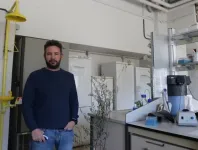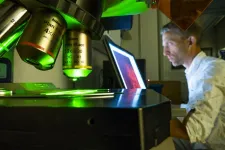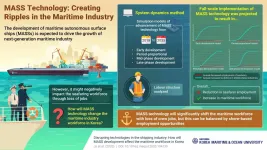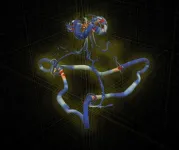Transformations within reach: Pathways to a sustainable and resilient world
2021-01-25
(Press-News.org) It is clear that COVID-19 has drastically changed our world, but how can we use the lessons learnt to build a more resilient and sustainable future? The International Institute for Applied Systems Analysis (IIASA) and the International Science Council (ISC) have drawn on the combined strengths and expertise of the two organizations to help find a way forward.
The COVID-19 pandemic, which has impacted almost every aspect of our lives over the past year, is a warning: We need to step back from business-as-usual onto new transformative pathways to reach the Sustainable Development Goals and the commitments of the Paris Agreement. Systems science is ideally positioned to address global impacts and harness opportunities brought about by COVID-19, as only systemic thinking and approaches can ensure that investment in post-COVID-19 recovery efforts is leveraged to embed the structural changes required for long-term sustainability and resilience with the multiple dividends that these will confer.
To address emerging issues and provide science based insights to make this possible, IIASA and the ISC brought together experts from all over the world through the IIASA-ISC Consultative Science Platform "Bouncing Forward Sustainably: Pathways to a post-COVID world". The platform serves as a global hub for consultation, deliberation, and collaboration among scientists, policymakers, and representatives from civil society around four key interconnected themes: Governance for Sustainability, Strengthening Science Systems, Resilient Food Systems, and Sustainable Energy. The outputs of the initiative, which are informed and supported by an advisory board under the patronage of the former Secretary-General of the United Nations, H.E. Ban Ki-moon, includes a series of reports with key messages and recommendations for policymakers, which will be launched at an event on Tuesday, 26 January:
Synthesis Report: This report is a synthesis of the four thematic reports produced as part of the IIASA-ISC Consultative Science Platform and presents eight recommendations that have the potential to enable systemic transformations and structural changes. Operationalizing these recommendations would facilitate a more sustainable and resilient future for humanity, as we recover from COVID-19. The authors, being conscious of the need for greater equity and resilience in a new sustainable future, have also sought to be practical by prioritizing the transformative changes that seem most feasible, can be applied early, and that could make a significant contribution to a sustainable recovery.
Enhancing Governance for Sustainability: The authors suggest that global cooperation is enhanced in mission-oriented ways to drive governance reform at all levels. This crisis may constitute an opportunity to enable higher levels of change in international governance arrangements, particularly with a view to mainstreaming a risk perspective and advocating for more reflexive, transformative governance, thus adding new dynamics to ongoing global governance reform initiatives. The report's recommendations include increasing awareness and understanding of compound and systemic risks across governance arrangements at multiple scales to be better prepared for similar crises in the future; moving systemic resilience center-stage; and devising and implementing a science-based tracking mechanism to assess the degree of alignment of COVID-19 recovery packages with the ambitions of the Sustainable Development Goals while focusing on generating systemic resilience.
Strengthening Science Systems: This report contains a number of recommendations grouped under five interrelated transformative changes aimed at ensuring a more effective response of the science system to future global crises. These changes address the need to strengthen transdisciplinary research on critical risks; enhance the diffusion of knowledge within the science system; increase the capacity of the science system to respond rapidly with high-quality research; improve the science-policy interface; and enhance public understanding and trust in science. The report also identifies three axes of simultaneous improvement to move science systems to a new frontier: reacting more rapidly through increased agility; enhancing the quality of output for greater reliability; and linking more effectively to policy and to the public for increased relevance.
Rethinking Energy Solutions: Three areas were identified for immediate action. All three are designed to address the drivers of demand and consumption through measures like remote working, digitalization, and the reshaping of urban spaces and their use; maximizing sustainable energy independence at local and individual levels through, for instance, decentralized renewable energy solutions and efficiency enhancing measures; and influencing behavior towards responsible consumption such as encouraging new trends in mobility, less material consumption, and sharing vs. ownership models.
Resilient Food Systems: The report argues that the emphasis on efficiency, which has to a large extent been driving the evolution of food systems, needs to be counter-balanced by a greater systemic emphasis on resilience and equity concerns. As illustrated by the pandemic, this entails expanding the scope and reach of social safety nets and protection schemes. It also includes assessing, and where necessary adjusting supply chains and trade in their capacity to absorb and adapt to a multitude of risks. Human and planetary health perspectives should be integral aspects of food system policies, regulations, and incentive structures going forward. Innovation capacities need be secured during the recovery to meet rising demands placed on the food system and enhance preparedness for future risks and sustainability challenges, supported by an emphasis on collaboration and strengthening of the science-policy interface for contextual solutions.
INFORMATION:
For further information and to access, read, and share the reports, please visit https://covid19.iiasa.ac.at/isc/outcome/.
Contacts:
Researcher contact
Leena Srivastava
IIASA Deputy Director General for Science
Tel: +43 2236 807 500
srivastava@iiasa.ac.at
Luis Gomez Echeverri
Emeritus Research Scholar
Tel: +43 2236 807 611
gomez@iiasa.ac.at
Press Officer
Ansa Heyl
IIASA Press Office
Tel: +43 2236 807 574
Mob: +43 676 83 807 574
heyl@iiasa.ac.at
About IIASA:
The International Institute for Applied Systems Analysis (IIASA) is an international scientific institute that conducts research into the critical issues of global environmental, economic, technological, and social change that we face in the twenty-first century. Our findings provide valuable options to policymakers to shape the future of our changing world. IIASA is independent and funded by prestigious research funding agencies in Africa, the Americas, Asia, and Europe. http://www.iiasa.ac.at
[Attachments] See images for this press release:

ELSE PRESS RELEASES FROM THIS DATE:
2021-01-25
For those who are diagnosed and have begun treatment for HIV, it is standard practice to regularly monitor viral load in the blood to assess response to treatment. A study of people living with HIV in Ethiopia shows that poverty and labour mobility are linked to high viral load despite treatment, indicating treatment failure. The researchers behind the study recommend that socioeconomic conditions should be taken into account to a greater extent in low-income countries to ensure that HIV treatment can achieve the best possible results.
Treatment using antiretroviral therapy (ART) is the same across the globe. For people living with HIV in low-income countries, however, ...
2021-01-25
Study conducted by researchers from the GIGA CRC In vivo Imaging laboratory at ULiège demonstrates, for the first time in humans, how the first deposits of tau proteins in the brainstem are associated with neurophysiological processes specific to the early stages of Alzheimer's disease development.
During the pre-clinical stages of Alzheimer's disease, i.e. when subtle changes are taking place in the brain but no cognitive symptoms can be observed, the cortex presents a state of transient hyperexcitability. To date, several studies conducted in animals have shown that tau and beta-amyloid proteins - central to the development of Alzheimer's disease - were associated with increased cortical excitability and dysfunction ...
2021-01-25
Olive trees are some of the most important woody crops in the world and Verticillium wilt, caused by the Verticillium dahliae fungus, is the most concerning disease for farmers in the olive sector.
In Spain, the leader in olive oil and table olive production, the increase in Verticillium wilt is primarily due to taking over infested soils formerly used for cotton (one of the main hosts for this pathogen) and the spread of a defoliating variant of the pathogen, which is more ferocious and ends up killing the olive tree.
This is why agronomy research efforts are focused on the search for the most resistant crops and the implementation of practices that reduce disease rates. In this vein, UCOLIVO Group researcher Juan Moral at the María de Maeztu Excellence Unit, Agronomy Department, ...
2021-01-25
ISIS, Al Qaeda, and the Taliban use their English-language magazines to encourage women to support jihad in different ways, according to new research.
Experts hope highlighting these varying recruitment strategies will be of use for those trying to stop radicalisation and terrorism.
The Taliban-produced magazines encourage women to carry out a traditional role in the home and support men rather than to be violent and commit jihad themselves. Tahrik-e Taliban Pakistan (TTP) and ISIS encourage women to be violent - to pick up arms and fight. The magazines encourage women to leave their husbands if they don't support jihad, even without permission.
Researchers from the University of Exeter analysed ...
2021-01-25
Scientists have identified that the evolutionary development of human and primate brains may have been similar for communication and memory.
Although speech and language are unique to humans, experts have found that the brain's pathway is similarly wired in monkeys which could signify an evolutionary process dating back at least 25 million years.
In a study, published in the journal Neuron, teams led by Newcastle University and the University of Iowa, compared auditory cortex information from humans and primates and found strong links.
Professor Chris Petkov, from Newcastle University's Faculty of Medical Sciences, UK, said: "Our language abilities help us to crystallise memories and make them vivid, such as 'the singer sounded ...
2021-01-25
Certain anchor proteins inhibit a key metabolic driver that plays an important role in cancer and developmental brain disorders. Scientists from the German Cancer Research Center (DKFZ) and the University of Innsbruck, together with a Europe-wide research network, discovered this molecular mechanism, which could open up new opportunities for personalized therapies for cancer and neuronal diseases. They published their results in the journal Cell.
The signaling protein MTOR (Mechanistic Target of Rapamycin) is a sensor for nutrients such as amino acids and sugars. When sufficient nutrients are available, MTOR boosts metabolism and ensures that sufficient energy and cellular building blocks are available. Since MTOR is a central switch for metabolism, ...
2021-01-25
All the cells in the human body share the same genes. But how our genes are expressed determines whether a cell becomes a brain cell or a liver cell. In addition, changes in gene expression often play a significant role in development of diseases.
One mechanism that contributes to the changes in gene expression is the interaction between the proteins called histones and enzymes known as HDACs. These enzymes help the cell divide and develop, which is the reason why they serve as targets for anti-cancer medicine: When you inhibit the enzymes, the cancer cells will stop dividing and growing further.
Despite being targets for clinically approved medicines, researchers do not know all the details of how they ...
2021-01-25
Special immune cells found in the brain, microglia, play a key role in the processes that make you feel uneasy and depressed in correlation with inflammation. This is the conclusion of a study using mice carried out by researchers at Linköping University, Sweden. The results have been published in the scientific journal Immunity, and suggest that microglial cells contribute to the negative mood experienced during several neurological diseases, and maybe also depression.
David Engblom's research group at Linköping University has spent many years looking at why inflammation in the body, such as a common cold or influenza, causes us to feel poorly ...
2021-01-25
Artificial intelligence and automation are changing the world, one industry at a time! Whatever humans can do, machines are learning to also do effectively, with lower costs and fewer errors. The maritime shipping industry is no different. Ships are now increasingly automated (called maritime autonomous surface ships or MASSs), reducing the need for human input. While this bodes well for labor and fuel costs, the question naturally raised is, what happens to the jobs of seafarers, the chief workforce of the shipping industry, once MASSs take over.
To find out, researchers from Korea used complex mathematical models and simulations ...
2021-01-25
RESEARCH TRIANGLE PARK, N.C. -- Design of Army aerial vehicles and weapon systems relies on the ability to predict aerodynamic behavior, often aided by advanced computer simulations of the flow of air over the body. High-fidelity simulations assist engineers in maximizing how much load a rotorcraft can lift or how far a missile can fly, but these simulations aren't cheap.
The simulations that designers currently use require extensive data processing on supercomputers and capture only a portion of vortex collision events - which can cause significant performance degradation, from loss of lift on a rotor to complete loss of control of a munition. A new turbulence model could change that.
The Army Research Office, an ...
LAST 30 PRESS RELEASES:
[Press-News.org] Transformations within reach: Pathways to a sustainable and resilient world





